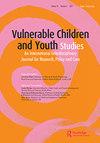Children and their experiences about seasonal flood disasters in Indonesia : qualitative study
IF 0.9
Q4 FAMILY STUDIES
引用次数: 0
Abstract
ABSTRACTFloods are a seasonal disaster for those who live in flood-prone areas. Children are a vulnerable group. Disasters can reduce the ability to adapt. This study aims to explore the experience of repeated flooding in children who live in flood-prone areas.Method: A qualitative study with a phenomenological design in Baleendah village, West Java. Qualitative phenomenological studies focus on details and aspects of children’s experiences that form the meaning and understanding of children about flooding. Fifteen participants were taken by purposive sampling. The inclusion criteria were aged 13–18 years, experienced a flood disaster, and lived in disaster-prone areas with moderate to high risk based on the Inarisk application. The collected data came through in-depth interviews with semi-structured interview guidelines. The analysis was carried out inductively to obtain themes based on in-depth interviews.Results: Fifteen children (ten girls and five boys) who have experienced flooding more than 2–5 times participated in the research. Children know about seasonal floods in their homes. They interpret it as an unpleasant experience repeated every rainy season and cannot be changed.There are five themes from this study: knowledge about flooding, feelings experienced, focus on solving flood problems, felt problems, and group beliefs.Conclusion: Repeated floods are stressors for children. They respond as unpleasant experiences. It indicates psychosocial problems in children in flood-prone areas. Children cannot overcome psychological problems independently and require mental health intervention for adaptation. A psychosocial intervention programme is essential for children who live in flood-prone areas.KEYWORDS: Childrenseasonal flooddisaster-proneunpleasant experience Disclosure statementNo potential conflict of interest was reported by the author(s).Additional informationFundingThe author(s) reported there is no funding associated with the work featured in this article.Notes on contributorsSusanti NimanSusanti Niman is a mental health nurse on mental health and psychiatric research. MustikasariMustikasari is a Senior Researcher at Universitas Indonesia.Novy Helena DaulimaNovy Helena Daulima is a Senior Researcher at Universitas Indonesia.Dewi GayatriDewi Gayatri is a Senior Researcher at Universitas Indonesia.Timothy RothhaarTimothy Rothhaar is an independent researcher in qualitative psychology.印度尼西亚儿童及其对季节性洪水灾害的经历:定性研究
【摘要】对于生活在洪水易发地区的人们来说,洪水是一种季节性灾害。儿童是弱势群体。灾难会降低人们的适应能力。本研究旨在探讨生活在洪水易发地区的儿童对反复洪水的体验。方法:采用现象学设计对西爪哇Baleendah村进行定性研究。定性现象学研究侧重于儿童经历的细节和方面,这些经历形成了儿童对洪水的意义和理解。采用有目的抽样法抽取15名参与者。入选标准为年龄13-18岁,经历过洪涝灾害,居住在灾害易发区,根据inrisk应用分为中高风险。收集的数据是通过半结构化访谈指南进行的深度访谈。在深入访谈的基础上进行归纳分析,获得主题。结果:15名经历过2-5次以上洪水的儿童(10名女孩,5名男孩)参与了研究。孩子们知道家里会发生季节性洪水。他们认为这是一种不愉快的经历,每个雨季都会重复出现,而且无法改变。本研究有五个主题:关于洪水的知识、经历的感受、解决洪水问题的重点、感受到的问题和群体信仰。结论:反复洪水是儿童的应激源。它们的反应是不愉快的经历。它表明了洪水易发地区儿童的社会心理问题。儿童不能独立克服心理问题,需要心理健康干预以适应。心理社会干预方案对生活在洪水易发地区的儿童至关重要。关键词:儿童季节性洪涝灾害易发不愉快经历披露声明作者未报告潜在利益冲突。其他信息资金作者报告没有与本文所述工作相关的资金。作者简介susanti Niman是一名从事心理健康和精神病学研究的心理健康护士。mustikasari是印度尼西亚大学的高级研究员。Novy Helena Daulima是印度尼西亚大学的高级研究员。Dewi GayatriDewi Gayatri是印度尼西亚大学的高级研究员。Timothy Rothhaar是一位独立的定性心理学研究者。
本文章由计算机程序翻译,如有差异,请以英文原文为准。
求助全文
约1分钟内获得全文
求助全文
来源期刊

Vulnerable Children and Youth Studies
FAMILY STUDIES-
CiteScore
1.90
自引率
0.00%
发文量
33
期刊介绍:
Vulnerable Children and Youth Studies is an essential peer-reviewed journal analyzing psychological, sociological, health, gender, cultural, economic, and educational aspects of children and adolescents in developed and developing countries. This international publication forum provides a much-needed interdisciplinary focus on vulnerable children and youth at risk, specifically in relation to health and welfare issues, such as mental health, illness (including HIV/AIDS), disability, abuse, neglect, institutionalization, poverty, orphanhood, exploitation, war, famine, and disaster.
 求助内容:
求助内容: 应助结果提醒方式:
应助结果提醒方式:


